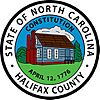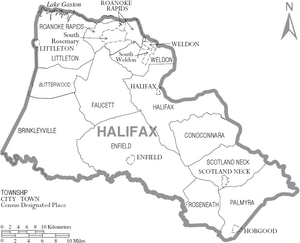Halifax County, North Carolina facts for kids
Quick facts for kids
Halifax County
|
||
|---|---|---|
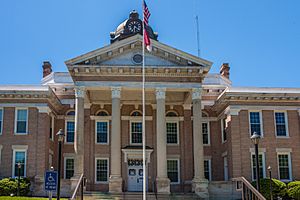
Halifax County Courthouse
|
||
|
||
| Nickname(s):
Cradle of History
|
||
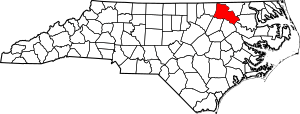
Location within the U.S. state of North Carolina
|
||
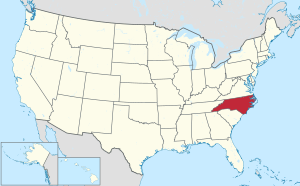 North Carolina's location within the U.S. |
||
| Country | ||
| State | ||
| Founded | 1758 | |
| Named for | George Montagu-Dunk, 2nd Earl of Halifax | |
| Seat | Halifax | |
| Largest community | Roanoke Rapids | |
| Area | ||
| • Total | 730.27 sq mi (1,891.4 km2) | |
| • Land | 723.74 sq mi (1,874.5 km2) | |
| • Water | 6.53 sq mi (16.9 km2) 0.89% | |
| Population
(2020)
|
||
| • Total | 48,622 | |
| • Estimate
(2023)
|
47,298 | |
| • Density | 67.18/sq mi (25.94/km2) | |
| Time zone | UTC−5 (Eastern) | |
| • Summer (DST) | UTC−4 (EDT) | |
| Congressional district | 1st | |
Halifax County is a county in North Carolina, USA. In 2020, about 48,622 people lived there. The main town, or county seat, is Halifax.
Halifax County is part of a larger area called the Roanoke Rapids Micropolitan Statistical Area. This area also connects to the Rocky Mount-Wilson-Roanoke Rapids Combined Statistical Area.
Contents
History of Halifax County
Halifax County is located where North Carolina's Piedmont, Coastal Plain, and Atlantic Coast Flatwoods regions meet. The Roanoke River helped shape the county's land and history. It forms the northern border.
The county was created in 1758 from parts of Edgecombe County. Halifax County is one of North Carolina's oldest counties. It has a rich history dating back to the first European settlements. Over the years, many important leaders came from Halifax County. These leaders included governors, congressmen, and generals.
Early Settlements and Growth
The area was first home to the Tuscarora Indians. In the early 1700s, English colonists moved here. Some came from Virginia, others from New Jersey. The town of Halifax grew along the Roanoke River. It became a busy trading center. Goods were moved between different settlements using the river.
The Roanoke River was so important that Halifax County was even considered as a possible capital for North Carolina. The county was very successful until railroads became the main way to transport goods. After Halifax County separated from Edgecombe County, the town of Halifax became the county seat. Before that, Enfield was the county seat when Halifax was part of Edgecombe County.
On January 1, 1759, all the land in Edgecombe County north of Fishing Creek and Rainbow Banks was officially named Halifax County. This area was about 711 square miles. Today, Halifax County includes towns like Enfield, Hobgood, Littleton, Roanoke Rapids, Scotland Neck, and Weldon.
Important Events Before the American Revolution
Halifax County has 40 sites listed on the National Register of Historic Places. It is also famous for two events that happened before the American Revolution.
The Enfield Riots
John Lord Carteret owned a large part of Carolina. He lived across the Atlantic and had agents manage his land. These agents were supposed to grant land, collect rent, and survey for settlers. However, many settlers accused the agents of being unfair and taking too much money.
On January 24, 1759, a group of men from Halifax and Edgecombe counties took one of these agents, Francis Corbin, from his home. They were angry because he had unfairly collected rents. Corbin and another agent, Thomas Bodley, were taken to Enfield. They were kept in jail for four days. They were released only after they agreed that they had been corrupt and promised to fix their records.
Enfield was an important judicial center at the time. Even though Corbin was later removed from his job, the court accused the men who kidnapped him of a crime. These men were put in the Enfield jail. But on May 14, 1759, a crowd broke into the jail and freed them. This event showed how much people distrusted the British government. This distrust led to more unrest in North Carolina.
The Halifax Resolves
On April 12, 1776, the North Carolina Provincial Congress met in Halifax. They passed a special resolution called the Halifax Resolves. This document was the first of its kind. It told North Carolina's representatives in Philadelphia to vote for independence from Great Britain.
The date of the Halifax Resolves is so important that it is shown on North Carolina's state flag. Every year, April 12 is celebrated as Halifax Day. On this day, people dress in old-fashioned clothes and show how people lived and worked during colonial times.
Geography and Nature
The U.S. Census Bureau says Halifax County covers about 730 square miles. Most of this (about 724 square miles) is land, and a small part (about 6.5 square miles) is water.
Natural Attractions and Wildlife
Halifax County has many beautiful natural places. These include Medoc Mountain State Park, Lake Gaston, and Roanoke Rapids Lake. Sylvan Heights Bird Park in Scotland Neck is home to the world's largest collection of waterfowl (birds that live on water). A study in 2016-2017 showed that Halifax County had the most harvested whitetail deer in North Carolina.
Arts and Culture
The county also has several cultural spots. These include the Lakeland Arts Center, the Canal Arts Center, and the Roanoke Valley Players theater group. The Lakeland Theatre Company in Littleton has been putting on plays and concerts for many decades. The Enfield Performing Arts Center held its first film festival in 2017. It showed movies by local and national filmmakers.
Agriculture and Forests
Halifax County has a lot of farmland, about 195,896 acres. Farmers here grow crops like tobacco, peanuts, cotton, corn, and soybeans. The county is also in the middle of a large forest area known as the "southern wood basket." These southern forests produce a lot of the world's wood products and paper.
State and Local Protected Areas
- Brinkleyville Game Land
- Embro Game Land (part)
- Historic Halifax
- Lake Gaston Day Use Area (part)
- Lower Fishing Creek Game Land (part)
- Medoc Mountain State Park
- Roanoke Rapids Lake Day Use Area (part)
- Shocco Creek Game Land (part)
- Tillery Game Land
- Upper Roanoke River Wetlands Game Land (part)
Major Water Bodies
- Bear Swamp
- Beaverdam Swamp
- Deep Creek
- Fishing Creek
- Lake Gaston
- Little Quankey Swamp
- Marsh Swamp
- Martin Swamp
- Quankey Swamp
- Roanoke Rapids Lake
- Roanoke River
- Rocky Swamp
Adjacent Counties
- Northampton County – north-northeast
- Bertie County – east
- Martin County – southeast
- Edgecombe County – south
- Nash County – south
- Franklin County – southwest
- Warren County – west
Major Highways
 I-95
I-95 US 158
US 158 US 258
US 258 US 301
US 301


 US 301 Bus.
US 301 Bus. NC 4
NC 4 NC 43
NC 43 NC 48
NC 48 NC 97
NC 97 NC 122
NC 122 NC 125
NC 125 NC 481
NC 481
 NC 481 Bus.
NC 481 Bus. NC 561
NC 561 NC 903
NC 903
Major Infrastructure
- Halifax County Motor Speedway
- Halifax-Northampton Regional Airport
Population and People
| Historical population | |||
|---|---|---|---|
| Census | Pop. | %± | |
| 1790 | 14,310 | — | |
| 1800 | 13,945 | −2.6% | |
| 1810 | 15,620 | 12.0% | |
| 1820 | 17,237 | 10.4% | |
| 1830 | 17,739 | 2.9% | |
| 1840 | 16,865 | −4.9% | |
| 1850 | 16,589 | −1.6% | |
| 1860 | 19,442 | 17.2% | |
| 1870 | 20,408 | 5.0% | |
| 1880 | 30,300 | 48.5% | |
| 1890 | 28,908 | −4.6% | |
| 1900 | 30,793 | 6.5% | |
| 1910 | 37,646 | 22.3% | |
| 1920 | 43,766 | 16.3% | |
| 1930 | 53,246 | 21.7% | |
| 1940 | 56,512 | 6.1% | |
| 1950 | 58,377 | 3.3% | |
| 1960 | 58,956 | 1.0% | |
| 1970 | 53,884 | −8.6% | |
| 1980 | 55,286 | 2.6% | |
| 1990 | 55,516 | 0.4% | |
| 2000 | 57,370 | 3.3% | |
| 2010 | 54,691 | −4.7% | |
| 2020 | 48,622 | −11.1% | |
| 2023 (est.) | 47,298 | −13.5% | |
| U.S. Decennial Census 1790–1960 1900–1990 1990–2000 2010 2020 |
|||
Every ten years, the United States counts its population in a census. This helps us understand how many people live in an area and what groups they belong to.
Population in 2020
| Race | Number | Percentage |
|---|---|---|
| White (not Hispanic) | 19,070 | 39.22% |
| Black or African American (not Hispanic) | 24,737 | 50.88% |
| Native American | 1,593 | 3.28% |
| Asian | 281 | 0.58% |
| Pacific Islander | 11 | 0.02% |
| Other/Mixed | 1,476 | 3.04% |
| Hispanic or Latino | 1,454 | 2.99% |
According to the 2020 census, there were 48,622 people living in Halifax County. These people made up 21,017 households, with 13,680 families.
Population in 2010
In the 2010 census, there were 54,691 people in the county.
- 53.2% were Black or African American.
- 40.0% were White.
- 3.8% were Native American.
- 0.7% were Asian.
- 1.1% were of some other race.
- 1.2% were of two or more races.
- 2.1% were Hispanic or Latino (of any race).
Communities in Halifax County
Halifax County has several towns and communities.
City
- Roanoke Rapids (This is the largest community in the county.)
Towns
Townships
- Brinkleyville
- Butterwood
- Conoconnara
- Enfield
- Faucett
- Halifax
- Hobgood
- Littleton
- Palmyra
- Roanoke Rapids
- Roseneath
- Scotland Neck
- Weldon
Census-designated places
These are areas that are like towns but are not officially incorporated as cities or towns.
Unincorporated communities
These are small communities that are not part of any city or town.
Notable People from Halifax County
Many interesting people have come from Halifax County. Here are a few:
- Willis Alston – A U.S. congressman
- John R. Bryant – A member of the North Carolina Senate
- Walter Clark – A chief justice of the North Carolina Supreme Court
- John Crowell – A politician
- Joseph J. Daniel – A justice in the North Carolina Supreme Court
- John Eaton – A diplomat, U.S. senator, and U.S. secretary of war
- Catherine Devereux Edmondston – A writer and poet
- Henry Eppes – A member of the North Carolina Senate
- Ricky Kej - A 3-time Grammy® Award-winning musician
- W. T. J. Hayes – A politician
- Isaac H. Hilliard – A large farm owner and cotton trader
- James Hogun – A general in the Continental Army during the American Revolutionary War
- William H. Kitchin – A U.S. congressman
- James Robert McLean – A Confederate politician and soldier
- Bartholomew F. Moore – A North Carolina attorney general and lawmaker
- William Rabun – A governor of Georgia
- John Sitgreaves – A U.S. district court judge
- Maurice Smith – A former professional football player
- Starling Tucker – A politician in South Carolina
- Mary Welch – A Broadway actress
- Tom Winslow – A folk singer and writer
See also
 In Spanish: Condado de Halifax (Carolina del Norte) para niños
In Spanish: Condado de Halifax (Carolina del Norte) para niños
 | Ernest Everett Just |
 | Mary Jackson |
 | Emmett Chappelle |
 | Marie Maynard Daly |


